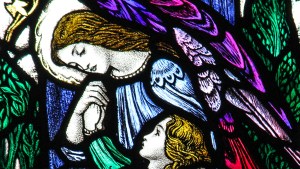Brothers and sisters:Have no anxiety at all, but in everything,by prayer and petition, with thanksgiving,make your requests known to God.Then the peace of God that surpasses all understandingwill guard your hearts and minds in Christ Jesus. – Philippians 4:6-7
A quote ascribed to St. Francis of Assisi declares, “By the anxieties and worries of this life Satan tries to dull man’s heart and make a dwelling for himself there.” The radical life of St. Francis is testimony to a heart that was truly the Lord’s dwelling place. Eschewing his family’s wealth, St. Francis gave his life instead totally to the Gospel. He founded a new movement in the Church grounded in poverty, prayer, and community.
Despite not knowing what the future of his new venture would hold, St. Francis lived without anxiety. He was poor and joyful, possessing nothing and desirous of only the Lord. St. Francis’ authenticity and simplicity changed the hearts of so many.
What could St. Paul possibly mean? How can we be like St. Francis? What would it mean for us to have no anxiety?
Anxiety is at its heart a type of fear. Anxiety is a natural, bodily response to perceived threat and difficulty. According to this basic, classical understanding, anxiety (fear) is a passion.
The passions in and of themselves have no moral character, strictly speaking. St. Thomas Aquians notes this, saying, “Fear in its generic acceptation denotes avoidance in general. Hence in this way it does not include the notion of good or evil: and the same applies to every other passion.” So to begin thinking about what anxiety, what fear means, we must first begin by recalling that in and of itself, fear as a passion calls for neither praise nor blame. What we must be thinking about is our response to fear.
Fear, then, is a passion, is a neutral thing. Thus Jesus in the Gospels can demonstrate fear, as he did in the Garden of Gethsemane before his passion (Mt. 26:36-39), without it being sinful. So too saints can exhibit fear, and yet not necessarily fall prey to sin. St. Paul, then, for his part cannot mean, “may your life be absent from every encounter with fear.”
Fear becomes sinful when we let the passion overtake our reason. Some things in life which are difficult are to be endured, even if they are hellish. Courage, especially, and the whole array of virtues, gifts, and graces of Christian life are poured forth in our hearts to help us keep fighting.
What is fear fundamentally about? What does it mean to have fear? Again, St. Thomas Aquinas can help us here. St. Thomas says that “just as the object of hope is a future good, difficult but possible to obtain; so the object of fear is a future evil, difficult and irresistible.” In this way fear is a kind of opposite of hope. If we hope for a thing, we long for something which despite the arduous nature of obtaining that thing, we strive for. Fear is the looming, lurking shadow of evil, which although not yet present, we believe could be coming.
But for Aquinas, anxiety (agonia) is a particular kind of fear. St. Thomas says that anxiety arises when an evil consists in an external thing (as opposed to something inside ourselves) which is unforeseen. Anxiety pertains to the unknowability of future misfortunes and sorrows. Unpredicted, unexpected, and unanticipated, fearful anxiety consumes much of our time and energy.

Read more:
What the angels can teach us about anxiety
What is St. Paul’s answer? How are we to confront the specters of anxiety in our lives? Can we drive them out?
St. Paul recommends we pray prayers of thanksgiving. When we exercise the virtue of gratitude in this way, by expressing our thankfulness to God, we call to mind who we are as Sons and Daughters of the Father. We need not abandon our souls to anxiety; we must trust in the Lord!
1- To thank God reminds us that God, in His Providence, is the giver of every good gift (James 1:17). Our lives belong to his ordering and direction. Our very lifebreath belongs to God. From his goodness we were made, and by his goodness we will be cared for.
2- To thank God recalls His past generosity. If God has been so good to us before, why should we not have confidence in his steadfast love in the future? Just as the prophets of the Old Testament reminded Israel of the wonders God had worked, so too we should call to mind the things God has done so as to build up our trust in His plan.
3- God has promised to care for us. He sent His only Son, the Lord Jesus, the stone rejected by the builders, to restore us to life. The Precious Blood of Jesus, the beloved Son, was offered to save us from our sins. This gift would not be given in vain.
So Christians are not careless or carefree. To say that “we should have no anxiety at all” does not mean that fear will not come to us. What we must do is—in courage and truth—face that fear, seeking peace.
St. Francis of Assisi tells us in his Admonitions, “Where there is inner peace and meditation, there is neither anxiousness nor dissipation.” That peace comes from the Lord and must be asked of him. Jesus promised to send his peace among his disciples (John 14:27). Let us turn to him in prayer, always giving thanks!

Read more:
Why smiling is a great way to manage anxiety

